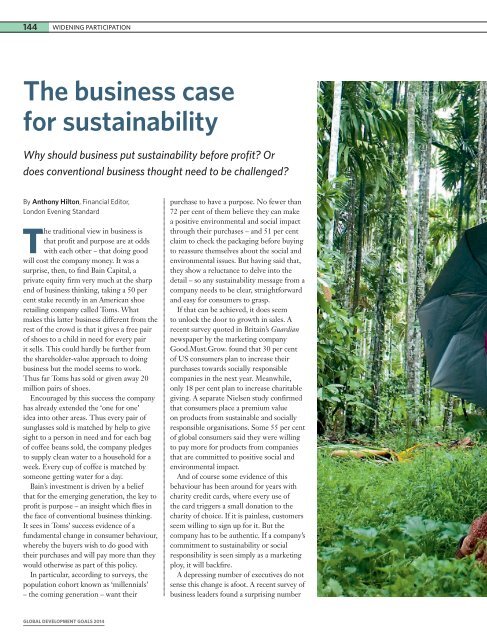FAMBB
FAMBB
FAMBB
You also want an ePaper? Increase the reach of your titles
YUMPU automatically turns print PDFs into web optimized ePapers that Google loves.
144 WIDENING PARTICIPATIONThe business casefor sustainabilityWhy should business put sustainability before profit? Ordoes conventional business thought need to be challenged?By Anthony Hilton, Financial Editor,London Evening StandardThe traditional view in business isthat profit and purpose are at oddswith each other – that doing goodwill cost the company money. It was asurprise, then, to find Bain Capital, aprivate equity firm very much at the sharpend of business thinking, taking a 50 percent stake recently in an American shoeretailing company called Toms. Whatmakes this latter business different from therest of the crowd is that it gives a free pairof shoes to a child in need for every pairit sells. This could hardly be further fromthe shareholder-value approach to doingbusiness but the model seems to work.Thus far Toms has sold or given away 20million pairs of shoes.Encouraged by this success the companyhas already extended the ‘one for one’idea into other areas. Thus every pair ofsunglasses sold is matched by help to givesight to a person in need and for each bagof coffee beans sold, the company pledgesto supply clean water to a household for aweek. Every cup of coffee is matched bysomeone getting water for a day.Bain’s investment is driven by a beliefthat for the emerging generation, the key toprofit is purpose – an insight which flies inthe face of conventional business thinking.It sees in Toms’ success evidence of afundamental change in consumer behaviour,whereby the buyers wish to do good withtheir purchases and will pay more than theywould otherwise as part of this policy.In particular, according to surveys, thepopulation cohort known as ‘millennials’– the coming generation – want theirpurchase to have a purpose. No fewer than72 per cent of them believe they can makea positive environmental and social impactthrough their purchases – and 51 per centclaim to check the packaging before buyingto reassure themselves about the social andenvironmental issues. But having said that,they show a reluctance to delve into thedetail – so any sustainability message from acompany needs to be clear, straightforwardand easy for consumers to grasp.If that can be achieved, it does seemto unlock the door to growth in sales. Arecent survey quoted in Britain’s Guardiannewspaper by the marketing companyGood.Must.Grow. found that 30 per centof US consumers plan to increase theirpurchases towards socially responsiblecompanies in the next year. Meanwhile,only 18 per cent plan to increase charitablegiving. A separate Nielsen study confirmedthat consumers place a premium valueon products from sustainable and sociallyresponsible organisations. Some 55 per centof global consumers said they were willingto pay more for products from companiesthat are committed to positive social andenvironmental impact.And of course some evidence of thisbehaviour has been around for years withcharity credit cards, where every use ofthe card triggers a small donation to thecharity of choice. If it is painless, customersseem willing to sign up for it. But thecompany has to be authentic. If a company’scommitment to sustainability or socialresponsibility is seen simply as a marketingploy, it will backfire.A depressing number of executives do notsense this change is afoot. A recent survey ofbusiness leaders found a surprising numberGLOBAL DEVELOPMENT GOALS 2014


